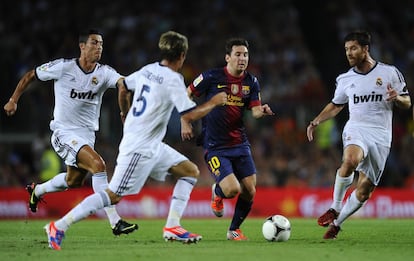Why Spanish courts convicted Leo Messi and acquitted Xabi Alonso of tax fraud
The transfer of image rights is not a crime but hiding income is

Spain’s Supreme Court has upheld Bayer Leverkusen coach and former pro player Xabi Alonso’s acquittal on three charges of financial crimes. The case was related to a contract that Alonso signed to transfer his image rights to a company based in Madeira (Portugal); other pro soccer players have used similar tax havens. The same court that just acquitted Alonso previously upheld a 2017 conviction of Leo Messi by the Provincial Court of Barcelona. When the Argentine superstar was still a minor, his parents signed a contract for the transfer of image rights that Messi later ratified when he turned 18. Why were there two very different outcomes for these similar cases? The Supreme Court ruling on Alonso explains why the two are not comparable.
The first component of the high court’s decision is technical. Messi was initially convicted by a Barcelona court, while Alonso was acquitted by a Madrid court. This limited the Supreme Court’s ability to overturn both rulings. The assessment of evidence made by a lower cannot be altered during an appeal for cassation (annulment) filed before the high court. The courts that convicted Messi and acquitted Alonso both made firm conclusions regarding the fraudulent intent behind the image rights contracts. While the Supreme Court found indications of potential fraud in Alonso’s case, the decision by the lower courts that the contract was not fraudulent influenced the high court’s decision.
However, apart from this technical element, the Supreme Court’s ruling on Alonso indicates that the former Real Madrid player’s behavior was not criminal. In contrast, the judge in the Messi case reached a different verdict. Although the origins of their tax mitigation strategies seemed similar, the cases revealed significant differences in their approaches.
When he was still a Liverpool player, Alonso transferred his image rights to the Kardzali management company in August 2009, a few days before signing with Real Madrid. The company was domiciled in Madeira, a Portuguese island with special corporate tax exemptions. Kardzali paid Alonso €288,305 ($305,000) in 2011 and €2.28 million ($2.4 million) in 2012, and although the player did not include them in his personal income tax return, he did declare them for wealth tax purposes. He also submitted a declaration of assets and rights held abroad, including those in Kardzali. Although the Kardzali contract was deemed to be a fictitious business arrangement by Spain’s Treasury Department and public prosecutor, Alonso’s tax declarations were crucial factors in the Supreme Court’s decision that the Bayer Leverkusen coach did not hide income from the taxman.
Although the Supreme Court warned that Alonso may face another legal dispute over the tax regime applicable to certain income, this doesn’t necessarily imply that fraud was committed. “If the settlement submitted by the taxable person (the taxpayer) includes all the profits from their economic activity but the tax authorities disagree with the method of taxation, the disagreement should focus on the amount rather than the basis for initiating a criminal procedure,” stated the Supreme Court. The decision validates a common practice among pro soccer players of transferring image rights to companies outside Spain. Cristiano Ronaldo and Javier Mascherano chose to plead guilty to settle similar charges and avoid severe penalties. However, Alonso decided to fight the charges and the Supreme Court ruled in his favor.
In Messi’s case, the structure was more complex and much less transparent. The Argentine player didn’t transfer his rights to a single company like Alonso. He first transferred them to a Belize-domiciled company in his mother’s name. The next day, Messi’s mother transferred them to another company in the U.K. (in which his father was an administrator), and another defendant signed on behalf of a company in Uruguay. Shortly thereafter, these companies signed contracts with others in Switzerland and the U.K. Laws in Belize and Uruguay permit companies with unclear ownership and income to establish themselves in their territory, stated the Barcelona court that heard the case. “They did not require tax returns, annual reports or account statements. They also exempted from taxes any income earned outside their territory.” The U.K. and Switzerland, countries with agreements to prevent double taxation, don’t penalize tax operations involving companies from Belize and Uruguay.
Unlike Alonso, who informed Spain’s Treasury Department of his income despite not declaring it on his personal income tax return, the Messis actively tried to conceal income from Spanish tax authorities. Messi was subsequently convicted of failing to pay €4.17 million ($4.45 million) in taxes from 2007-2009. During oral arguments in June 2016, lawyers for the Messis said the player had delegated tax matters to his father, who in turn relied on advisors. “The defendants’ exculpatory argument, for which they even seek praise, suggests they contracted highly skilled and trained professionals dedicated to ensuring fulfillment of their tax obligations. However, this type of argument is not particularly weighty,” concluded the Supreme Court, which did not believe that the Messis were unaware of their tax obligations. “Based on this, it can be inferred that when the defendants sought out these professionals, their purpose was not solely to understand and fulfill their tax obligations, but rather how to evade them.”
Sign up for our weekly newsletter to get more English-language news coverage from EL PAÍS USA Edition
Tu suscripción se está usando en otro dispositivo
¿Quieres añadir otro usuario a tu suscripción?
Si continúas leyendo en este dispositivo, no se podrá leer en el otro.
FlechaTu suscripción se está usando en otro dispositivo y solo puedes acceder a EL PAÍS desde un dispositivo a la vez.
Si quieres compartir tu cuenta, cambia tu suscripción a la modalidad Premium, así podrás añadir otro usuario. Cada uno accederá con su propia cuenta de email, lo que os permitirá personalizar vuestra experiencia en EL PAÍS.
¿Tienes una suscripción de empresa? Accede aquí para contratar más cuentas.
En el caso de no saber quién está usando tu cuenta, te recomendamos cambiar tu contraseña aquí.
Si decides continuar compartiendo tu cuenta, este mensaje se mostrará en tu dispositivo y en el de la otra persona que está usando tu cuenta de forma indefinida, afectando a tu experiencia de lectura. Puedes consultar aquí los términos y condiciones de la suscripción digital.









































